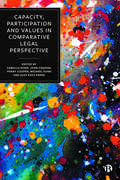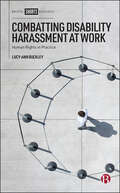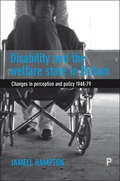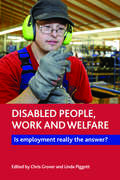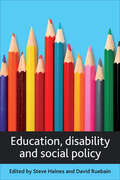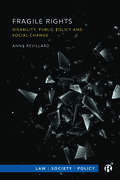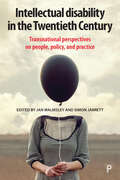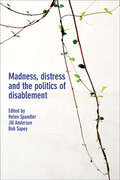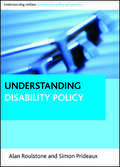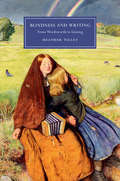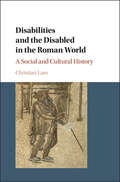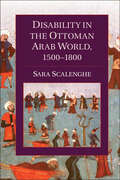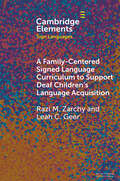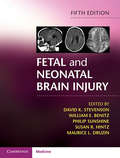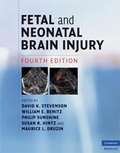- Table View
- List View
Woman's Day – 9 August 2021
by Blind SaThis booklet published by Blind SA highlights the stories; the struggles, the ABILITY and the strength of BLIND AND PARTIALLY SIGHTED women who have and are taking the reins in this journey called life. We applaud them, and take strength from their achievements.
Capacity, Participation and Values in Comparative Legal Perspective
by Camillia Kong, John Coggon, Penny Cooper, Michael Dunn andWith contributions from an international team of experts, this collection provides a much-needed international, comparative approach to mental capacity law. The book focuses particularly on exploring substantive commonalities and divergences in normative orientation and practical application embedded in different legal frameworks. It draws together contributions from eleven different jurisdictions across Europe, Asia and the UK and explores what productive or unproductive values and practices currently exist. By providing a detailed comparison of how legal and ethical commitments to persons with disabilities are framed in capacity law across different national systems, the book highlights the values and practices that could lead to changes that better respect persons with disabilities in mental capacity regimes.
Combatting Disability Harassment at Work: Human Rights in Practice
by Lucy-Ann BuckleyPersons with disabilities report high levels of harassment worldwide, often based on intersectional characteristics such as race, gender and age. However, while #MeToo and #BlackLivesMatter have highlighted ongoing experiences of sexual and racial harassment, disability harassment has received little attention. This book focuses on legal measures to combat disability harassment at work. It sets disability harassment in its international context, including its human rights framework, and confronts the lack of empirical information by evaluating the Irish legal framework in practice. It explores the capacity of the law to address intersectional harassment, particularly that faced by women with disabilities, and outlines the barriers to effective legal solutions.
Disability and the Welfare State in Britain: Changes in Perception and Policy 1948–79
by Jameel HamptonCreated during and after the Second World War, the British Welfare State seemed to promise welfare for all, but, in its original form, excluded millions of disabled people. This book examines attempts in the subsequent three decades to reverse this exclusion. It is the first to contextualise disability historically in the welfare state and under each government of the period. It looks at how disability policy and perceptions were slow to change as a welfare issue, which is very timely in today’s climate of austerity. It also provides the first major analysis of the Disablement Income Group, one of the most powerful pressure groups in the period and the 1972 Thalidomide campaign and its effect on the Heath government. Given the recent emergence of the history of disability in Britain as a major area of research, the book will be ideal for academics, students and activists seeking a better understanding of the topic.
Disabled People, Work and Welfare: Is Employment Really the Answer?
by Chris Grover and Linda PiggottThis is the first book to challenge the concept of paid work for disabled people as a means to ‘independence’ and ‘self determination’. Recent attempts in many countries to increase the employment rates of disabled people have actually led to an erosion of financial support for many workless disabled people and their increasing stigmatisation as ‘scroungers’. Led by the disability movement’s concern with the employment choices faced by disabled people, this controversial book uses sociological and philosophical approaches, as well as international examples, to critically engage with possible alternatives to paid work. Essential reading for students, practitioners, activists and anyone interested in relationships between work, welfare and disability.
Education, disability and social policy
by David Ruebain and Steve HainesDisability is an increasingly vital contemporary issue in British social policy especially in education. Education, disability and social policy brings together for the first time unique perspectives from leading thinkers including senior academics, opinion formers, policy makers and school leaders. Key issues covered include: law and international human rights frameworks; policy developments for schools and school leaders; educational inequalities for disabled children and young people and curriculum design and qualifications changes for children who are being failed by the current education system. The book is a milestone in social policy studies, of enduring interest to students, academics, policy makers, parents and campaigners alike.
Fragile Rights: Disability, Public Policy, and Social Change
by Anne RevillardThe French version of this book was the winner of the 2022 Grand Prix de la Protection Sociale. Over the years many disability-related rights have been legally recognized, but how has this changed the everyday lives of people with disabilities? Drawing on biographical interviews collected from individuals with mobility or visual impairments in France, this book analyses the reception of disability policies in the fields of education, employment, social rights and accessibility. It examines to what extent these policies contribute to the realization of associated rights among disabled people. The book demonstrates that the rights associated with disability suffer from major implementation flaws, while shedding light on the very active role of disabled citizens in the realization of their rights.
Intellectual Disability in the Twentieth Century: Transnational Perspectives on People, Policy, and Practice
by Jan Walmsley and Simon JarrettWith contributions from distinguished authors in 14 countries across 5 continents, this book provides a unique transnational perspective on intellectual disability in the twentieth century. Each chapter outlines different policies and practices, and details real-life accounts from those living with intellectual disabilities to illustrate their impact of policies and practices on these people and their families. Bringing together accounts of how intellectual disability was viewed, managed and experienced in countries across the globe, the book examines the origins and nature of contemporary attitudes, policy and practice and sheds light on the challenges of implementing the UN Convention on the Rights of Persons with Disabilities (UNCPRD).
Madness, Distress and the Politics of Disablement
by Helen Spandler, Jill Anderson and Bob SapeyThis book explores the challenges of applying disability theory and policy, including the social model of disability, to madness and distress. It brings together leading scholars and activists from Europe, North America, Australia and India, to explore the relationship between madness, distress and disability. Whether mental health problems should be viewed as disabilities is a pressing concern, especially since the inclusion of psychosocial disability in the UN Convention on the Rights of Persons with Disabilities. This book will appeal to policy makers, practitioners, activists and academics.
Understanding Disability Policy (Understanding Welfare: Social Issues, Policy and Practice series)
by Alan Roulstone Simon PrideauxIn an era of scarce social resources the question of the changing social policy constructions and responses to disabled people has become increasingly important. Paradoxically, some disabled people are realising new freedoms and choices never before envisioned, whilst others are prey to major retractions in public services and aggressive attempts to redefine who counts as 'genuinely disabled'. Understanding disability policy locates disability policy into broader social policy and welfare policy writings and goes beyond narrow statutory evaluations of welfare to embrace a range of indicators of disabled people's welfare. The book critically explores the roles of social security, social support, poverty, socio-economic status, community safety, official discourses and spatial change in shaping disabled people's opportunities. It also situates welfare and disability policy in the broader conceptual shifts to the social model of disability and its critics. Finally it explores the possible connection between changing official and academic constructions of disability and their implications for social policy in the 21st century. The book is supported by a companion website, containing additional materials for both students and lecturers using the book, which is available from the link above.
Active Citizenship and Disability
by Andrew Power Janet E. Lord Allison S. DeFranco Andrew Power Janet E. Lord Allison S. DefrancoThis book provides an international comparative study of the implementation of disability rights law and policy focused on the emerging principles of self-determination and personalisation. It explores how these principles have been enshrined in the United Nations Convention on the Rights of Persons with Disabilities and how different jurisdictions have implemented them to enable meaningful engagement and participation by persons with disabilities in society. The philosophy of 'active citizenship' underpinning the Convention - that all citizens should (be able to) actively participate in the community - provides the core focal point of this book, which grounds its analysis in exploring how this goal has been imagined and implemented across a range of countries. The case studies examine how different jurisdictions have reformed disability law and policy and reconfigured how support is administered and funded to ensure maximum choice and independence is accorded to people with disabilities.
Approaches to the Evolution of Language: Language in Prehistory
by Alan BarnardFor ninety per cent of our history, humans have lived as 'hunters and gatherers', and for most of this time, as talking individuals. No direct evidence for the origin and evolution of language exists; we do not even know if early humans had language, either spoken or signed. Taking an anthropological perspective, Alan Barnard acknowledges this difficulty and argues that we can nevertheless infer a great deal about our linguistic past from what is around us in the present. Hunter-gatherers still inhabit much of the world, and in sufficient number to enable us to study the ways in which they speak, the many languages they use, and what they use them for. Barnard investigates the lives of hunter-gatherers by understanding them in their own terms, to create a book which will be welcomed by all those interested in the evolution of language.
Australian Sign Language (Auslan)
by Trevor Johnston Adam SchembriThis is first comprehensive introduction to the linguistics of Auslan, the sign language of Australia. Assuming no prior background in language study, it explores each key aspect of the structure of Auslan, providing an accessible overview of its grammar (how sentences are structured), phonology (the building blocks of signs), morphology (the structure of signs), lexicon (vocabulary), semantics (how meaning is created), and discourse (how Auslan is used in context). The authors also discuss a range of myths and misunderstandings about sign languages, provide an insight into the history and development of Auslan, and show how Auslan is related to other sign languages, such as those used in Britain, the USA and New Zealand. Complete with clear illustrations of the signs in use and useful further reading lists, this is an ideal resource for anyone interested in Auslan, as well as those seeking a clear, general introduction to sign language linguistics.
Bioethics and Disability
by Alicia OuelletteBioethics and Disability provides tools for understanding the concerns, fears, and biases that have convinced some people with disabilities that the health care setting is a dangerous place and some bioethicists that disability activists have nothing to offer bioethics. It wrestles with the charge that bioethics as a discipline devalues the lives of persons with disabilities, arguing that reconciling the competing concerns of the disability community and the autonomy-based approach of mainstream bioethics is not only possible, but essential for a bioethics committed to facilitating good medical decision making and promoting respect for all persons, regardless of ability. Through in-depth case studies involving newborns, children, and adults with disabilities, Bioethics and Disability proposes a new model for medical decision making that is both sensitive to and sensible about the fact of disability in medical cases. Disability-conscious bioethics will bring together disability experts and bioethicists to identify and mitigate disability bias in our health care systems.
Cambridge Studies in Nineteenth-Century Literature and Culture: From Wordsworth to Gissing (Cambridge Studies in Nineteenth-Century Literature and Culture #109)
by Heather Tilley<P>In this innovative and important study, Heather Tilley examines the huge shifts that took place in the experience and conceptualisation of blindness during the nineteenth century, and demonstrates how new writing technologies for blind people had transformative effects on literary culture. <P>Considering the ways in which visually-impaired people used textual means to shape their own identities, the book argues that blindness was also a significant trope through which writers reflected on the act of crafting literary form. <P>Supported by an illuminating range of archival material (including unpublished letters from Wordsworth's circle, early ophthalmologic texts, embossed books, and autobiographies) this is a rich account of blind people's experience, and reveals the close, and often surprising personal engagement that canonical writers had with visual impairment. <P>Drawing on the insights of disability studies and cultural phenomenology, Tilley highlights the importance of attending to embodied experience in the production and consumption of texts.
Disabilities and the Disabled in the Roman World: A Social And Cultural History
by Christian LaesAlmost fifteen per cent of the world's population today experiences some form of mental or physical disability and society tries to accommodate their needs. But what was the situation in the Roman world? Was there a concept of disability? How were the disabled treated? How did they manage in their daily lives? What answers did medical doctors, philosophers and patristic writers give for their problems? <P><P>This book, the first monograph on the subject in English, explores the medical and material contexts for disability in the ancient world, and discusses the chances of survival for those who were born with a handicap. It covers the various sorts of disability: mental problems, blindness, deafness and deaf-muteness, speech impairment and mobility impairment, and includes discussions of famous instances of disability from the ancient world, such as the madness of Emperor Caligula, the stuttering of Emperor Claudius and the blindness of Homer.<P> The first scholarly study of the subject in English.<P> Comprehensively engages with literary sources, legal texts, epigraphy and papyrology, as well as with material evidence such as iconography.<P> Adopts an explicitly comparative approach which constantly seeks dialogue with new approaches and studies concerning other periods.
Disability and Information Technology
by Eliza VarneyDisability and Information Technology examines the extent to which regulatory frameworks for information and communication technologies (ICTs) safeguard the rights of persons with disabilities as citizenship rights. It adopts a comparative approach focused on four case studies: Canada, the European Union, the United Kingdom and the United States. It focuses on the tension between social and economic values in the regulation of ICTs and calls for a regulatory approach based on a framework of principles that reflects citizenship values. The analysis identifies challenges encountered in the jurisdictions examined and points toward the rights-based approach advanced by the UN Convention on the Rights of Persons with Disabilities as a benchmark in protecting the rights of persons with disabilities to have equal access to information. The research draws on a wealth of resources, including legislation, cases, interviews, consultation documents and responses from organisations representing persons with disabilities.
Disability and Political Theory
by Barbara Arneil Nancy J. HirschmannThough disability scholarship has been robust in history, philosophy, English, and sociology for decades, political theory and political science more generally have been slow to catch up. This groundbreaking volume presents the first full-length book on political theory approaches to disability issues. Barbara Arneil and Nancy J. Hirschmann bring together some of the leading scholars in political theory to provide a historical analysis of disability through the works of canonical figures, ranging from Hobbes and Locke to Kant, Rawls and Arendt, as well as an analysis of disability in contemporary political theory, examining key concepts, such as freedom, power and justice. Disability and Political Theory introduces a new disciplinary framework to disability studies, and provides a comprehensive introduction to a new topic of political theory.
Disability and the Good Human Life
by Jerome E. Bickenbach Franziska Felder Barbara Schmitz Jerome E. Bickenbach Franziska FelderThis collection of original essays, from both established scholars and newcomers, takes up a recent debate in philosophy, sociology, and disability studies on whether disability is intrinsically a harm that lowers a person's quality of life. While this is a new question in disability scholarship, it also touches on one of the oldest philosophical questions: what is the good human life? Historically, philosophers have not been interested in the topic of disability, and when they are it is usually only in relation to questions such as euthanasia, abortion, or the moral status of disabled people. Consequently disability has been either ignored by moral and political philosophers or simply equated with a bad human life, a life not worth living. This collection takes up the challenge that disability poses to basic questions of political philosophy and bioethics, among others, by focusing on fundamental issues and practical implications of the relationship between disability and the good human life.
Disability in the Ottoman Arab World, 1500-1800 (Cambridge Studies in Islamic Civilization)
by Sara ScalenghePhysical, sensory, and mental impairments can influence an individual's status in society as much as the more familiar categories of gender, class, religion, race, and ethnicity. This was especially true of the early modern Arab Ottoman world, where being judged able or disabled impacted every aspect of a person's life, including performance of religious ritual, marriage, job opportunities, and the ability to buy and sell property. Sara Scalenghe's book is the first on the history of both physical and mental disabilities in the Middle East and North Africa, and the first to examine disability in the non-Western world before the nineteenth century. Unlike previous scholarly works that examine disability as discussed in religious texts such as the Qur'an and the Hadith, this study focuses on representations and classifications of disability and impairment across a wide range of biographical, legal, medical, and divinatory primary sources.
eQuality
by Peter Blanck J. D. David BraddockNever before have the civil rights of people with disabilities aligned so well with developments in information and communication technology. The center of the technology revolution is the Internet's World Wide Web, which fosters unprecedented opportunities for engagement in democratic society. The Americans with Disabilities Act likewise is helping to ensure equal participation in society by people with disabilities. Globally, the Convention on the Rights of Persons with Disabilities further affirms that persons with disabilities are entitled to the full and equal enjoyment of fundamental personal freedoms. This book is about the lived struggle for disability rights, with a focus on Web equality for people with cognitive disabilities, such as intellectual disabilities, autism, and print-related disabilities. The principles derived from the right to the Web - freedom of speech and individual dignity - are bound to lead toward full and meaningful involvement in society for persons with cognitive and other disabilities.
A Family-Centered Signed Language Curriculum to Support Deaf Children's Language Acquisition (Elements in Sign Languages)
by Razi M. Zarchy Leah C. GeerDeaf children experience language deprivation at alarmingly high rates. One contributing factor is that most are born to non-signing hearing parents who face insurmountable barriers to learning a signed language. This Element presents a case for developing signed language curricula for hearing families with deaf children that are family-centered and focus on child-directed language. Core vocabulary, functional sentences, and facilitative language techniques centered around common daily routines allow families to apply what they learn immediately. Additionally, Deaf Community Cultural Wealth (DCCW) lessons build families' capacity to navigate the new terrain of raising a deaf child. If early intervention programs serving the families of young deaf children incorporate this type of curriculum into their service delivery, survey data suggest that it is both effective and approachable for this target population, so the rates of language deprivation may decline.
Family Policy and Disability
by Arie RimmermanThis book explores the status and scope of family policies related to households of children with disabilities, providing an in-depth, evidence-based review of legal, programmatic issues. It includes a discussion of the gaps between family needs and contemporary family policies in the United States and European countries, as demonstrated in these households' surveys. In addition, the volume offers a comparative analysis of cash benefits, tax credits and deductions, and in-kind provisions between the United States and select European countries (UK, France, and Sweden). Most importantly, this book identifies and continues the discussion regarding the critical role of family-centered policies, as expressed in the United Nations Convention on the Rights of Persons with Disabilities (UNCRPD), as well as the future of family policy toward families of children with disabilities at a time of economic crisis.
Fetal and Neonatal Brain Injury: Mechanisms, Management And The Risks Of Practice
by David K. Stevenson William E. Benitz Philip Sunshine Susan R. Hintz Maurice L. DruzinImprovements in the detection of fetal and neonatal brain injuries, advances in our understanding of the pathophysiology, cellular and molecular bases of encephalopathy, and new treatment options have all combined to produce significant changes in the management of neonatal brain disorders in the past few years. This new edition of Fetal and Neonatal Brain Injury brings the reader fully up to date with all advances in clinical management and outcome assessment. New material includes pregnancy-induced hypertension, HELLP syndrome and chronic hypertension, complications of multiple gestation, neurogenic disorders of the brain, neonatal stroke and much more. An expanded, highly illustrated chapter on structural and functional imaging of the fetal and neonatal brain is also included. An outstanding international team of highly experienced neonatologists and maternal-fetal medicine clinicians have produced a practical, authoritative clinical text that gives clear management advice to all clinicians involved in the treatment of these patients.
Fetal and Neonatal Brain Injury
by David K. Stevenson William E. Benitz Philip Sunshine Susan R. Hintz Maurice L. DruzinImprovements in the detection of fetal and neonatal brain injuries, advances in our understanding of the pathophysiology, cellular and molecular bases of encephalopathy, and new treatment options have all combined to produce significant changes in the management of neonatal brain disorders in the past few years. This new edition of Fetal and Neonatal Brain Injury brings the reader fully up to date with all advances in clinical management and outcome assessment. New material includes pregnancy-induced hypertension, HELLP syndrome and chronic hypertension, complications of multiple gestation, neurogenic disorders of the brain, neonatal stroke and much more. An expanded, highly illustrated chapter on structural and functional imaging of the fetal and neonatal brain is also included. An outstanding international team of highly experienced neonatologists and maternal-fetal medicine clinicians have produced a practical, authoritative clinical text that gives clear management advice to all clinicians involved in the treatment of these patients.

